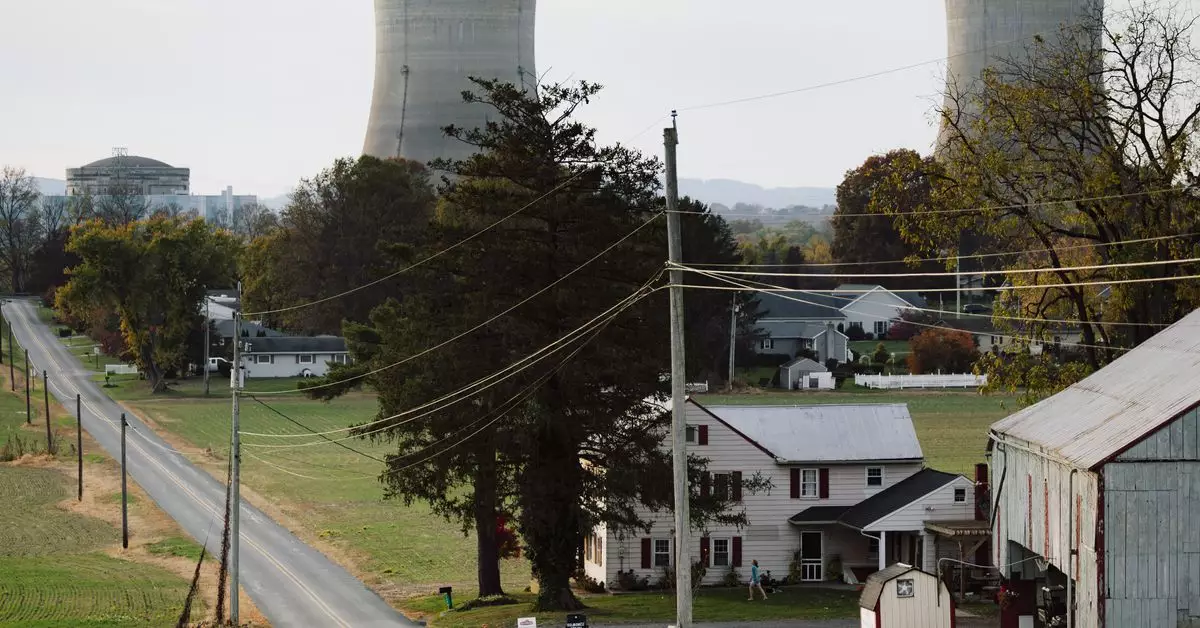In a significant shift towards sustainable energy practices, the General Services Administration (GSA) has recently secured a groundbreaking nuclear energy contract valued at $840 million. This ten-year deal aims to provide an impressive 10 million megawatt-hours of electricity, sufficient to power over 1 million homes annually. The contract, awarded to Constellation, a major player in the nuclear energy sector, represents a pivotal moment not just for government energy procurement, but also for the nuclear industry at large.
For years, nuclear energy has often been overlooked as a viable option in the discussions surrounding sustainable energy. However, with rising energy demands, particularly from the burgeoning artificial intelligence (AI) sector, nuclear energy has begun to reclaim its position in the spotlight. Major tech firms like Microsoft, Google, Amazon, and Meta have swiftly embraced nuclear energy as a reliable solution to meet their pressing electricity needs. Microsoft’s recent agreement with Constellation to restart the Three Mile Island reactor, historically significant due to its previous accident, underscores the renewed optimism in nuclear energy’s potential.
The United States government, as the country’s largest energy consumer, holds tremendous potential to catalyze this renaissance in nuclear energy. By awarding this substantial contract, the GSA is not merely making a procurement; it is endorsing a national commitment to secure reliable and clean energy. As Constellation’s President and CEO, Joe Dominguez, stated, the exclusion of nuclear energy from previous sustainable energy initiatives is now a concern of the past, marking a shift in the industry’s landscape.
Constellation proudly claims to furnish 10% of the nation’s carbon pollution-free energy, primarily derived from its nuclear fleet. As climate change becomes an increasingly urgent crisis, the role of nuclear energy in reducing carbon emissions cannot be understated. Not only does nuclear energy provide a stable and significant contribution to America’s energy grid, but it also serves as a crucial alternative during periods of high demand when renewable sources may falter.
The GSA’s agreement with Constellation also emphasizes the company’s ambitious goal of achieving 100% carbon-free electricity by 2040. Through investments in modern technology and enhanced nuclear facilities, the contract will allow Constellation to extend the operational lifespan of existing plants, bolstering its capacity to deliver clean energy efficiently. The addition of 135 megawatts of capacity bolsters the resilience and reliability of both the energy provider and the federal government, enhancing their preparedness for fluctuating electricity needs.
A Broader Economic Perspective
Beyond the implications for energy, this contract speaks volumes about the economic considerations surrounding energy procurement. By locking in competitive rates for the next decade, the GSA aims to protect federal agencies from the uncertainties of future energy pricing. Data centers, particularly those powered by AI technologies, are expected to generate rising demand for clean energy, leading to increased competition for these essential resources. The GSA’s proactive approach affords vital budgetary predictability for government agencies while also stimulating domestic nuclear energy production.
Additionally, the contract extends its reach beyond the GSA alone, covering 13 federal agencies, including the Departments of Transportation and Veterans Affairs, as well as national staples like the Social Security Administration. This wide-reaching agreement signifies a comprehensive strategy aimed at advancing clean energy initiatives across the federal landscape. It places the U.S. government in league with the growing number of corporate entities pivoting toward nuclear solutions—a trend that promises to enhance both energy security and environmental stewardship.
The Future of Nuclear Energy in America
As the landscape of energy consumption continues to evolve, the federal government’s renewed commitment to nuclear energy, alongside significant collaborations with corporate giants, signals a transformative era. The Biden administration’s explicit support for nuclear energy as a cornerstone in transitioning away from fossil fuels highlights the broader policy trends emerging in the clean energy sector.
Notably, significant funding initiatives such as the Department of Energy’s $1.52 billion loan to restart a dormant nuclear facility in Michigan reflect a growing governmental investment in harnessing nuclear energy as a stable and sustainable resource. By recognizing the importance of nuclear energy alongside other renewable sources, the U.S. is poised to reshape its energy future in a manner that addresses both environmental concerns and economic necessities.
The recent GSA contract with Constellation heralds a significant evolution in the commitment to nuclear energy in the United States. By positioning itself as a leader in clean energy procurement, the GSA not only secures affordable electricity for numerous agencies, but also propels the nuclear industry into a new chapter of innovation and growth. As demand for clean energy continues to rise amidst escalating climate concerns, this landmark agreement exemplifies the federal government’s role in fostering a sustainable energy future while effectively addressing the challenges of tomorrow.


Leave a Reply